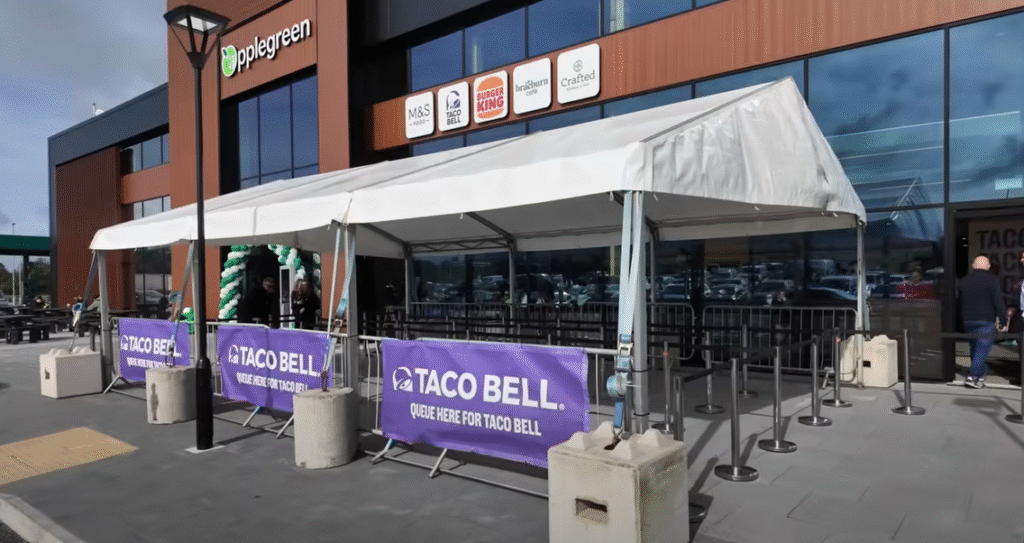Ireland has welcomed Taco Bell’s debut with incredible fervor, as though a superstar’s long-awaited tour had finally arrived in the country. Early morning lines showed how excited people were when the first branch opened in Dunshaughlin, County Meath, on September 16, 2025. Before the 10 a.m. opening, customers flocked in, excited not only for the tacos but also for the experience of being a part of something new. The first fifty customers were given exclusive merchandise, which quickly turned into memorabilia and looked a lot like concert wristbands or autographed jerseys after a sporting event.
A motorway stop was given a surprisingly modern feel thanks to Applegreen’s €15 million investment. Combining Taco Bell with a Burger King, an M&S Food store, and Applegreen’s custom deli Crafted made the establishment more than just a place to fill up. It became known as a place for families, commuters, and tourists to stop, rest, and enjoy themselves. The setting, which includes a Braeburn Coffee Café and even a kids’ play area, is more like a thoughtfully planned airport terminal than a typical roadside rest stop. The location became especially inventive with the addition of eight EV charging ports, bringing fast food into line with sustainability and emerging transportation trends.
Taco Bell Ireland – Key Information
| Attribute | Details |
|---|---|
| Name | Taco Bell Ireland |
| Founded (Ireland) | 16 September 2025 |
| First Location | Junction 6, M3, Dunshaughlin, Co Meath |
| Investment | €15 million (by Applegreen) |
| Operator | Applegreen (partnership with Taco Bell / Yum! Brands) |
| Jobs Created | 100+ at first site |
| Planned Expansion | Cork, Dublin, and more locations in next 5 years |
| Menu Highlights | Tacos, burritos, quesadillas, nachos, Crunchwrap Supreme |
| Parent Company | Yum! Brands (also owns KFC, Pizza Hut) |
| Website | RTÉ – Taco Bell Ireland Coverage |

Similarities to the way other American chains used to enter Ireland have surfaced in recent days. In contrast to Domino’s, which became a mainstay at student events, Starbucks was first questioned before establishing itself. From burritos to quesadillas, Taco Bell’s Mexican-inspired menu items feel very different but are remarkably adaptable to suit Irish palates. Young fans can already be seen jokingly discussing on TikTok whether a taco can take the place of the classic crisp sandwich. Even though this type of cultural teasing is lighthearted, it highlights how global food chains change and gradually become ingrained in national identities.
Applegreen’s strategic move to partner with Taco Bell was incredibly effective in diversifying roadside hospitality and generating jobs. In Dunshaughlin, more than 100 jobs were created, which is especially helpful now as young people look for flexible work arrangements. In an effort to improve customer experiences, Seamus Stapleton, managing director of Applegreen’s Irish division, emphasized that the website “sets the standard” for service areas. Remarkably successful in changing perceptions of what a pit stop can be, his remarks reflected a larger goal: to make eating while traveling less transactional and more memorable.
The Taco Bell story There is more to Ireland than just one place. It’s part of Applegreen’s €1 billion plan to expand in the US, UK, and Ireland. This bears a striking resemblance to the way Apple established itself in Cork decades ago or Netflix invested in Dublin as a European hub. Ireland’s population’s receptiveness to global culture helps it draw in foreign brands. The arrival of Taco Bell has the same symbolic significance—it shows that Ireland is still a top consumer brand.
What is particularly evident is that Taco Bell sells identity in addition to food. Taco Bell is a means for Irish youth to connect with something accessible and global. It becomes a cultural shorthand to hold a Crunchwrap Supreme, much like wearing Nike sneakers or drinking a Pumpkin Spice Latte. From Kylie Jenner to Post Malone, celebrities from other countries have frequently shared pictures of themselves holding Taco Bell bags. Irish fans who had previously only been able to observe these posts from a distance can now participate directly thanks to the ripple effect. This cultural mirroring illustrates how fast food offers more than just calories; it also serves as a gateway to broader associations with lifestyle.
Naturally, there were questions. Some skeptics on Reddit made jokes about how the introduction of burritos and spicy sauces would affect Irish sewage systems. Such humor, however, is a part of the custom that welcomes each newcomer. Similar skepticism existed decades ago before McDonald’s rose to prominence. As part of the process of cultural assimilation, Taco Bell will probably eventually figure out how to add Irish flavors. The idea of a taco with Irish cheddar or a burrito with potatoes may seem out of the ordinary, but these modifications are frequently surprisingly inexpensive ways to reach local markets.
At the launch, the long lines outside Meath’s Taco Bell reflected the excitement of a new movie or album release. People wanted to be there to participate in a first as well as to eat. Instagram posts and TikTok videos enhanced the opening’s effectiveness in creating buzz. This type of marketing is much quicker and frequently more genuine than traditional advertising because it is produced naturally by the consumers themselves. Taco Bell Ireland is positioned as a brand that has been introduced and immediately integrated into the online discourse.
In the future, Taco Bell’s expansion to Cork and Dublin is anticipated to further integrate into Irish culture. City branches might prioritize late-night delivery and service to appeal to students and those who enjoy the nightlife. Taco Bell thus faces off against local chippers and kebab shops rather than the traditional fast food behemoths. The degree to which it maintains its American edge while adjusting to these urban environments will determine how successful it is.

